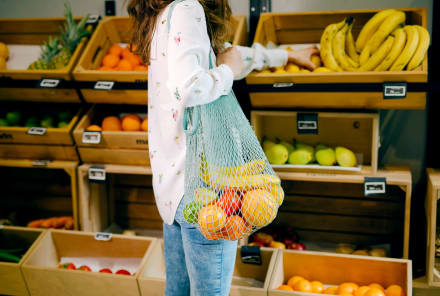Advertisement
Uh, Can You Spot A Narcissist By Their Eating Habits? New Study Suggests Maybe


If you suspect you're dealing with a narcissist, you'll first want to look out for a few personality traits: constantly needing attention, routinely crossing boundaries, and seriously lacking empathy are all telling signs. But you also may want to pay attention to what the narcissist in question puts on their plate—literally.
According to new research, narcissists may share similar eating patterns and exert their outsized confidence using food. Here's what the researchers found and what it means for narcissists, and their health, in the long run.
Studying narcissistic eating patterns
New research published in Psychology & Marketing set up three studies in which a group of people (including some who exhibit narcissistic tendencies of overconfidence and a need for admiration) were asked to make food choices after being told about the health benefits and risks of certain ingredients.
"I got the idea from a previous paper on narcissism, which showed that the most narcissistic people drink more wine than others, simply to show off," says Renaud Lunardo, study co-author and senior professor of marketing at Kedge Business School in Bordeaux, France. "We thought that even if wine is a special drink because it's complex and socially rewarding, the same could be said for other more common food products, such as healthy products, which are also rewarding."
In the first study, 644 adults were offered wine—a beverage that is rich in health-promoting polyphenols1 but also can be harmful in high doses2. In the second, a separate group was offered chocolates—another food that isn't all that healthy but does have antioxidant properties3. Before being presented with these foods, participants answered questions that gave researchers a rough idea of how narcissistic they were—such as “I tend to want others to admire me." (So, those who were deemed narcissistic in this study did not necessarily qualify for the clinical diagnosis of narcissistic personality disorder.)
Interestingly enough, researchers found that people who exhibited narcissism were more likely to consume more wine and chocolate—likely because they overemphasized their positive health benefits. This is in line with previous research that has found that narcissism correlates positively with optimism bias4, meaning narcissists tend to "misjudge and overestimate their own susceptibility to positive/negative events," researchers note.
In a third study, 333 U.S.-based participants were asked to imagine being offered durian under two scenarios: when they were home alone, or socializing with friends and colleagues. They first read a short overview of the fruit's benefits (promotes heart health) and drawbacks (smelly, high in natural sugars). Durian was chosen because it is a relatively unfamiliar fruit to most people in the states, so participants were unlikely to have preconceived ideas about it going into the study.
In general, we tend to make different food choices when eating with other people versus eating alone5. And this proved true for the narcissists in this study, too: They were more likely to focus more on health-related food hazards when they imagined eating with other people—so ultimately, they opted to eat less durian in the social setting.
Summary
So, what does this mean & why is it important?
Now, just because you enjoy wine or chocolate doesn't automatically make you a narcissist. Several factors influence food choices, including upbringing, culture, activity level, mental well-being, and more.
However, this study adds to a growing body of research on how one's personality may impact their dietary preferences. (Previous studies have found that openness and conscientiousness positively correlate with more plant-based diets6, for example.)
The authors of this new research were interested in studying narcissists, given their unique approach to weighing benefits and risks. As expected, this seemed to bleed into their food choices.
This led researchers to consider how marketers might change the way they describe food to speak to this population better. In the study's discussion section, they concluded that this research reinforces the need to communicate honestly on food packaging and not overstate a food's health benefits (for the sake of narcissists... and everyone else). They also noted that adding streamlined labels to unhealthy products (like adding a warning to addicting ultra-processed snacks, for example) could be a helpful way to reduce narcissists' risks of obesity7 and other health problems down the line.
This recommendation could prove particularly important as narcissistic tendencies increase around the world. "Everyone these days seems to look for a moment of glory," says Lunardo. "It seems that having one's behavior approved by others—by a like on Facebook or Instagram, for example—is a preoccupation for many people. I don't know whether this is linked to a growing sense of insecurity that would lead people to seek reassurance in the approval of others, but that's what we seem to be seeing."
The takeaway
Narcissism can impact many elements of our lives—including, it turns out, our diet. New research finds that those who are more narcissistic tend to overestimate the health benefits of their food, though not when they're in social settings.
Of course, personality is only one of many factors that contribute to our food choices. However, this study raises important questions about how we can design food labels to best convey their health profile to as many people as possible—your narcissistic ex included.
7 Sources
- https://pubmed.ncbi.nlm.nih.gov/29210129/
- https://pubmed.ncbi.nlm.nih.gov/37111141/
- https://www.ncbi.nlm.nih.gov/pmc/articles/PMC9589144/
- https://pubmed.ncbi.nlm.nih.gov/7034551/
- https://pubmed.ncbi.nlm.nih.gov/25174571/
- https://pubmed.ncbi.nlm.nih.gov/31945405/
- https://www.sciencedirect.com/science/article/pii/S0306987716304455
Watch Next
Enjoy some of our favorite clips from classes
Enjoy some of our favorite clips from classes
What Is Meditation?
Mindfulness/Spirituality | Light Watkins
Box Breathing
Mindfulness/Spirituality | Gwen Dittmar
What Breathwork Can Address
Mindfulness/Spirituality | Gwen Dittmar
The 8 Limbs of Yoga - What is Asana?
Yoga | Caley Alyssa
Two Standing Postures to Open Up Tight Hips
Yoga | Caley Alyssa
How Plants Can Optimize Athletic Performance
Nutrition | Rich Roll
What to Eat Before a Workout
Nutrition | Rich Roll
How Ayurveda Helps Us Navigate Modern Life
Nutrition | Sahara Rose
Messages About Love & Relationships
Love & Relationships | Esther Perel
Love Languages
Love & Relationships | Esther Perel
What Is Meditation?
Box Breathing
What Breathwork Can Address
The 8 Limbs of Yoga - What is Asana?
Two Standing Postures to Open Up Tight Hips
How Plants Can Optimize Athletic Performance
What to Eat Before a Workout
How Ayurveda Helps Us Navigate Modern Life
Messages About Love & Relationships
Love Languages
Advertisement

This Type Of Fat Is Vital For Women's Health — Are You Getting Enough?
Molly Knudsen, M.S., RDN

New Study Confirms The 3 Habits That Age Your Brain Faster
Molly Knudsen, M.S., RDN

This Type Of Fat Is Vital For Women's Health — Are You Getting Enough?
Molly Knudsen, M.S., RDN

New Study Confirms The 3 Habits That Age Your Brain Faster
Molly Knudsen, M.S., RDN













